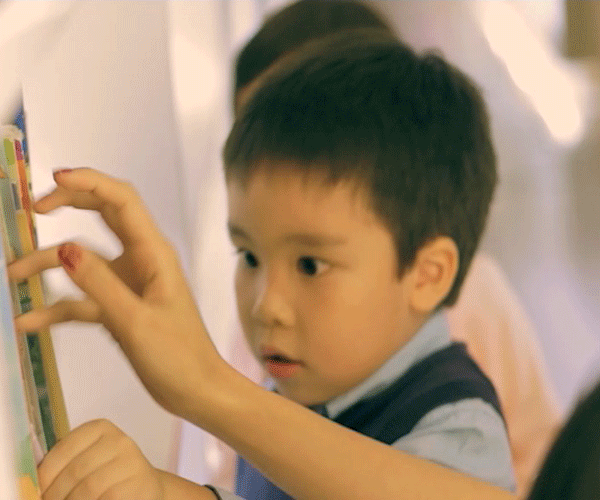
Great learning experiences help your child build a positive attitude towards learning, especially at a young age.
The right preschool education can have a huge impact as it gives your child ample opportunities to:
Develop Social & Communication Skills

Developing social and communication skills is important because it helps to shape how your child interacts with others.
Become Accustomed to School

Preschool education acts as a platform to help your child adapt to a school environment in Primary 1.
Yet as seemingly innocuous as it seems, the preschool years can be challenging for some children and their parents too.
In this article, Sue Lynn Lee, TLL's Early Years Academic Director, highlights five problems parents typically raise about their kindergarteners and how you can go about solving it.

1. "My Child Does Not Follow Instructions Well"
As a parent, you can help your child follow instructions through positive reinforcements at home.
Be sure to praise your child when he or she successfully completes tasks you have assigned to him or her with.
This could be as simple as acknowledging your child's efforts in making his or her own bed or clearing the plates after mealtime.
To help your child learn about following instructions, our teachers recommend helping your child break down the given instructions — step-by-step instructions are very important.
For example, if you would like to teach your child how to highlight parts of a text, you can start off by holding your child's hand and completing the action together, whilst verbally sharing what it means to “highlight” the words.
We have put together a simple and fun activity sheet your child to help your child learn about following instructions.
Click here or the following image to download and try out these fun exercises!

2. "My Child Has Separation Anxiety"
One of the best way to help your child cope with separation anxiety is to walk away calmly but firmly. We know it is never easy but here's a "trick" we would like to recommend.
Always bid your child goodbye before walking away — don’t let your child feel abandoned.
One example of how you can do this would be to say, “Bye, Marcus. Mummy will be back at 5pm to pick you up. Have fun in class!” and then walk away.
This reassures your child that you will be back after class, and may help your child better deal with the initial anxiety of being away from you.

3. "My Child Does Not like to Read"
Throughout your child’s preschool education, he or she will need to build up reading and writing skills that are pivotal to his or her ability to express himself or herself and communicate with others effectively.
If your child does not like to read, you can motivate him or her to read by allocating time each day to read with him or her.
For a start, you may want to read to your child while he or she points at the words and even reads along with you. Remember to make reading fun and playful — when your child comes across a new verb (an action word), bring out the actor or actress in you!
Your child will better understand what he or she is reading better when he or she can visualise the meaning behind each words. As your child's confidence in reading grows over time, you may want to encourage him or her to read parts of the story on his or her own too.
Additionally, you can also surround your child with good reading materials. Having a wide array of age-appropriate interesting books at home goes a long way in developing a positive reading habit. The more your child is exposed to good books, the more reading will become a part of his or her daily life.
Related Article: Make Reading A Part Of Your Child's Routine

4. "My Child Has Difficulty Communicating His or Her Thoughts"
Children who develop strong language and communication skills are more likely to arrive at school ready to learn.
When your child is able to communicate, he or she will be able to exchange ideas more effectively and interact meaningfully with his or her peers.
That is why it is important for parents and educators to focus on creating a safe environment for preschool children to speak openly and confidently at home and in school.
At home, you can engage your child in conversation by asking him or her about his or her day at school. Encourage your child to share with you what he or she enjoys about school and any difficulties he or she may be facing.
Getting your child into a habit of talking and sharing can help him or her better verbalise his or her thoughts. Additionally, you can also try getting your child to read aloud to develop his or her confidence in speaking.
To bolster your child’s verbal skills and critical-thinking abilities, you can even ask your child what he or she likes or does not like about a book or character. Ask your child what he or she would do differently if he or she was the character or how he or she wants the story to end.
Such complementary reading activities help your child to exercise his or her imagination and think beyond what he or she is reading.

5. "My Child Can't Focus in Class"
To help your child learn to focus and build a sense of discipline, introduce fixed pockets of time at home for “work”. Set small and achievable goals for these periods of time and reward positive behaviour.
Breaking tasks into small, simple steps help students stay engaged. Preschool lessons at TLL include games and songs to inject fun and keep lessons upbeat — they are also very effective methods to engage your child.
Watch Our Video: What You Can Expect from TLL's Early Years Programmes
What Goes on in Our Kindergarten Lessons?
At TLL, we believe in empowering your child to learn, create and achieve through lessons that are directly relevant to his or her learning needs. We want to work together with you to help your child overcome challenges he or she may face.
The Learning Lab is now at locations. Find a location that suits your needs.
If you have any enquiries about our Early Years programmes, please email us at enquiry@thelearninglab.com.sg or call us at 6733 8711 and we will be happy to assist you.



